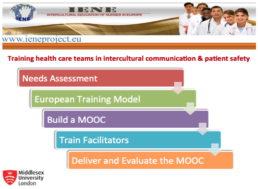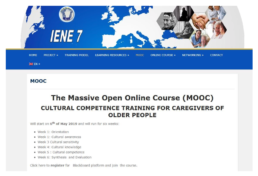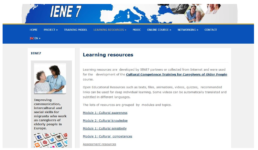The MOOC Projects
MOOC Project 1: Culturally competent compassion
Creator and main author: Professor Irena Papadopoulos
This taster MOOC, aimed to address the following questions:
- What is compassion?
- Is it an inborn characteristic or do we learn this as we go through life?
- If compassion is inborn, does this mean that everyone understands it and expresses it in the same way?
- If we learn compassion as we go through life, how does our family, our cultural group, our education, our gender etc influence the way we understand and express compassion?
- Are nurses and other health professionals being encouraged to cultivate and apply compassion? If yes, how is this done, if no, why is it not done?
It lasted three weeks with a fourth dedicated to assessments for those who wish to obtain a certificate of attendance. The educational approach which underpins the course is based on co-creation of knowledge which requires active engagement and participation.
The themes of the MOOC were: a) culture and diversity, b) cultural competence, c) culturally competent compassion.
MOOC Project 2: Training health care teams in intercultural communication & patient safety
The IENE5 project ‘Training health care teams in intercultural communication and patient safety’ was funded by the EU ERASMUS+ programme. The main components of the project are listed in Fig 1 below.
During this project a MOOC (Massive Online Open Access Course) was developed and delivered by the project team. The MOOC had three main foci: a) Intercultural communication b) Developing multicultural/multidisciplinary healthcare teams c) Patient safety.
You are invited to view the two animations on the right created by Professor Papadopoulos specifically for this MOOC.
MOOC Project 3: Cultural Competence Training for Caregivers of Older People
Population ageing is a long-term trend. The EU-28’s old-age dependency ratio is projected to increase from 28.8 % in 2015 to 51.0 % by 2080 (Eurostat, June 2016). Providing long-term care in home, is proving to be a viable and cost effective alternative to institutional care. Due to the increasing numbers of older adults and the demand for the home direct-care workers all over Europe, there is a current and, possible, future shortage of trained caregivers.
In many EU Member States, migrants are filling this labour gap, providing essential care services. Migrant elderly caregivers are dealing with important challenges of inadequate education and training, low wages, minimal worker benefits, lack of career advancement opportunities, and erratic and often part-time employment. The lack of adequate training for elderly caregivers remains a major gap in workforce development.
The MOOC Cultural Competence Training for Caregivers of Older People was designed to help migrant caregivers, volunteers and students to acquire relevant knowledge, intercultural and social skills, foreign languages and digital skills, and to empower them with the capacity to establish a positive communication, friendly environment, positive interaction and relationships with older adults.
The course was developed with the contribution of five partners from four countries: Edunet Association, Craiova, Romania; Middlesex University, London, UK; University of Almeria, Spain; University of Catania, Italy; EAS28 – Commune di Ortona, Italy.
To learn more about the project, please, visit our website https://iene7.eu/. An ample array of additional learning resources around compassionate and culturally competent care for older adults is also available at https://iene7.eu/learning-resources.
This project was developed with the support of the European Commission. Its content reflects the views only of the authors, and the Commission cannot be held responsible for any use which may be made of the information contained herein.



